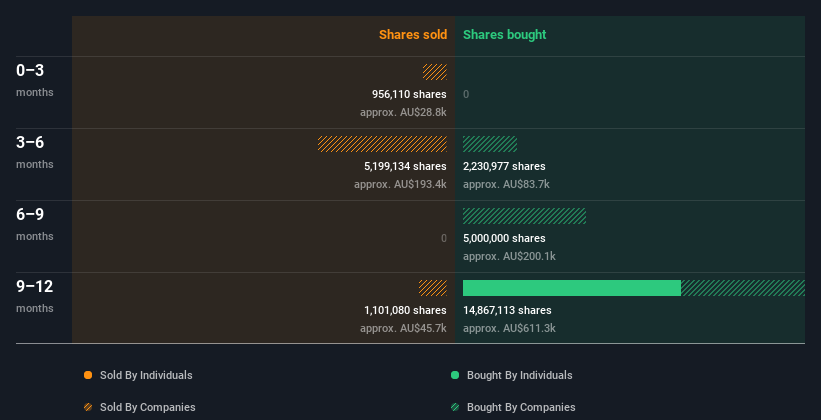Positive Signs As Multiple Insiders Buy Zimi Stock
Usually, when one insider buys stock, it might not be a monumental event. But when multiple insiders are buying like they did in the case of Zimi Limited (ASX:ZMM), that sends out a positive message to the company's shareholders.
While we would never suggest that investors should base their decisions solely on what the directors of a company have been doing, logic dictates you should pay some attention to whether insiders are buying or selling shares.
Check out our latest analysis for Zimi
Zimi Insider Transactions Over The Last Year
Over the last year, we can see that the biggest insider purchase was by Non-Executive Chairman of the Board Simon Gerard for AU$300k worth of shares, at about AU$0.04 per share. That means that even when the share price was higher than AU$0.026 (the recent price), an insider wanted to purchase shares. It's very possible they regret the purchase, but it's more likely they are bullish about the company. We always take careful note of the price insiders pay when purchasing shares. Generally speaking, it catches our eye when insiders have purchased shares at above current prices, as it suggests they believed the shares were worth buying, even at a higher price.
Zimi insiders may have bought shares in the last year, but they didn't sell any. You can see the insider transactions (by companies and individuals) over the last year depicted in the chart below. If you click on the chart, you can see all the individual transactions, including the share price, individual, and the date!
Zimi is not the only stock that insiders are buying. For those who like to find winning investments this free list of growing companies with recent insider purchasing, could be just the ticket.
Does Zimi Boast High Insider Ownership?
I like to look at how many shares insiders own in a company, to help inform my view of how aligned they are with insiders. Usually, the higher the insider ownership, the more likely it is that insiders will be incentivised to build the company for the long term. It's great to see that Zimi insiders own 46% of the company, worth about AU$1.5m. I like to see this level of insider ownership, because it increases the chances that management are thinking about the best interests of shareholders.
What Might The Insider Transactions At Zimi Tell Us?
There haven't been any insider transactions in the last three months -- that doesn't mean much. However, our analysis of transactions over the last year is heartening. Judging from their transactions, and high insider ownership, Zimi insiders feel good about the company's future. In addition to knowing about insider transactions going on, it's beneficial to identify the risks facing Zimi. For instance, we've identified 5 warning signs for Zimi (2 are concerning) you should be aware of.
But note: Zimi may not be the best stock to buy. So take a peek at this free list of interesting companies with high ROE and low debt.
For the purposes of this article, insiders are those individuals who report their transactions to the relevant regulatory body. We currently account for open market transactions and private dispositions of direct interests only, but not derivative transactions or indirect interests.
Have feedback on this article? Concerned about the content? Get in touch with us directly. Alternatively, email editorial-team (at) simplywallst.com.
This article by Simply Wall St is general in nature. We provide commentary based on historical data and analyst forecasts only using an unbiased methodology and our articles are not intended to be financial advice. It does not constitute a recommendation to buy or sell any stock, and does not take account of your objectives, or your financial situation. We aim to bring you long-term focused analysis driven by fundamental data. Note that our analysis may not factor in the latest price-sensitive company announcements or qualitative material. Simply Wall St has no position in any stocks mentioned.

 Yahoo Finance
Yahoo Finance 
